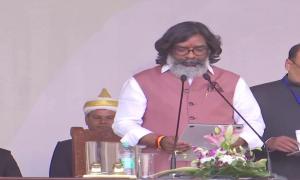Jeddah, Saudi Arabia: An element of farce and futility pervaded the Jeddah Energy Meeting in Saudi Arabia on the June 22. But the lack of communication that attended that gathering was best symbolised for me the next day when, as part of a journalist pack, I was flown to Khurais - the new showpiece oil production facility of Saudi Aramco, the state-owned oil monolith.
The trip was organised to demonstrate Saudi readiness to boost global oil supply. From mid-2009, Khurais will add 1.2 million barrels a day to global production.
Minutes after the Saudi Aramco owned Boeing 737 lifted off from Jeddah, the aircraft's audio system crackled to life with a rendition of the takbeer, an Arabic invocation to the greatness of Allah.
With the British journalist from AFP next to me suddenly getting restless, and noticeably paler, I asked him if he needed an airsick bag. Shaking his head over the incantations of Allah-ho-Akbar, he muttered tightly, "Do you think we're okay? This chanting you remember those airliners on 9/11?"
The Jeddah Energy Meeting was all about similar miscommunication. To sit in that ornate four-acre hall in Jeddah was to experience, first hand, all the contradictions that roil the world of oil.
That the gathering was more about Saudi Arabia than about oil prices became quickly evident at the start of the proceedings when Saudi King Abdullah bin Abdul Aziz al Saud (referred to by everyone, through the proceedings, as the honourific, "Custodian of the Two Holy Mosques) walked in, deferentially flanked by Gordon Brown and Chinese Vice-President Xi Jinping. They shared the high table with the King and with Saudi Oil Minister Ali Al-Naimi; lesser ministers, with fewer oil resources, sat with their delegations in a hollow square of tables around the room.
Vice-President Xi, in a lengthy speech, did what the Chinese do best; he said nothing, waiting prudently to sniff the breeze before delivering opinions or making commitments. Three hours of ministerial speeches later, Xi could only have concluded that the traders buying up oil futures knew what they were doing. There was no bridging the sharp divide between oil buyers (who stridently demanded higher production in order to bring down prices), and oil producers (who averred that production levels were fine, it was speculators who were driving up the prices).
US Energy Secretary Samuel Bodman summed up the oil buyers' case: "World oil consumption growth has averaged 1.8 per cent per year But for the past three years global oil production has remained constant at roughly 85 million barrels per day. If there are no additional supplies of oil, for every 1 per cent increase in demand, we would expect a 20 per cent increase in price to balance the market."
And muddying the waters were mavericks like Iran, who squarely blamed America for the high oil prices. Blaming falling production on sanctions against oil-rich states (read Iran), the Iranian minister also pointed out that when oil had plummeted to $10 a barrel, buyers had insisted, "Leave it to the market." Why now, he asked, did the markets suddenly need regulation?
Amidst the ministerial bickering, the journalist pack speculated on the incongruous presence of Gordon Brown. The buzz was that he had come down to reassure the Saudi royals that he had scuttled a renewed probe into the notorious Al Yamamah scandal: the apparently bribe-facilitated sale of billions of dollars worth of fighter aircraft and missiles by British Aerospace and its successor, BAE Systems, to Saudi Arabia.
The deal - in which Saudi Arabia has already paid a mind-boggling $40 billion for arms and is fishing in its wallet for another $48 billion - was evidently greased with payments to Saudi Royals from a $60 million "slush fund" run by BAE Systems.
The Al Yamamah deal (which has been categorised as "the biggest (British) sale ever, of anything to anyone") was endangered by a probe by the UK Serious Frauds Office. But in 2006, after the Saudis threatened to cancel an order for 72 Eurofighters, British Attorney General, Lord Goldsmith, announced that the probe was being called off. In a public admission that money and influence came before the law, the House of Lords was informed, "It has been necessary to balance the need to maintain the rule of law against the wider public interest."
But the British courts had reopened the probe last November and the Saudis were livid. Happily, now Gordon Brown has produced a reassuring solution for King Abdullah. The newly-appointed head of the Serious Frauds Office, Richard Alderman, has proposed that companies that bribed their way to foreign deals could avoid prosecution by admitting their guilt and paying a fine. That ingenious solution might have been enough to make the British PM the most important visitor in the Jeddah Energy Meeting.
If attendance is any yardstick, the Jeddah meet was a resounding success. Sitting there were the oil ministers of 36 countries, seven international organisations like OPEC and the International Energy Agency, and every national and multinational oil company worth the name. Going by outcomes however, the Jeddah summit was a noteworthy flop; oil prices continue the worrisome rise that led to that meeting.









More from rediff